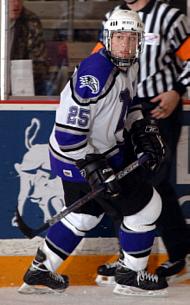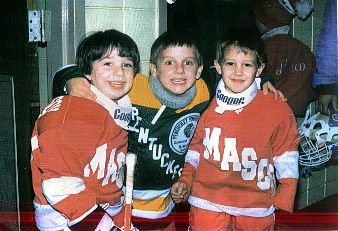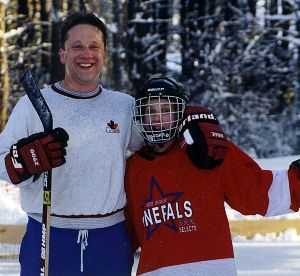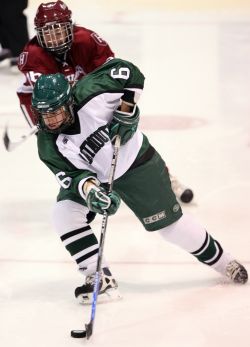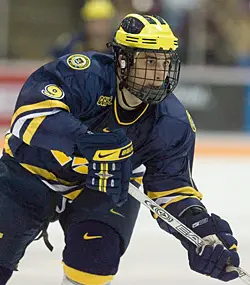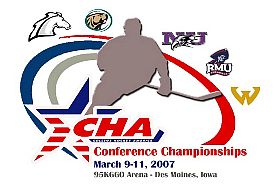Second round. Quarterfinals, to be more precise, and a third of the league is done for the season.
Farewell and happy trails to Rensselaer, Yale, Brown and Union. See you again in October. Everyone knows they deserved better, but this is the ECACHL, and that means you have to earn it every single game.
Which brings us to those who have. Only Clarkson could afford to lose this series and still look forward to further postseason play; St. Lawrence is on the right side of the bubble, but achieving anything short of the finals will make for a tough sell to the selection committee.
Dartmouth, Quinnipiac and Cornell fall beneath the Saints on the PairWise Rankings, and will — in all likelihood — have to win out to qualify for the national tourney. Obviously, the same holds true for Colgate, Harvard and Princeton as well.
So let’s see get down to it.
Handicapping the quarterfinals
No. 8 Colgate 7-12-3 (15-19-4) @ No. 1 St. Lawrence 16-5-1 (20-12-2)
Head-to-head Draw, 1-1-0
Colgate on the road 2-7-2 (4-9-2 overall)
St. Lawrence at home 10-1-0 (12-4-0 overall)
Special teams power play: Colgate, 11th — 13.5% (14.5) SLU, fifth — 17.9% (15.9) penalty kill: Colgate, 4th — 85.3% (84.9) SLU, first — 90.3% (86.5)
Team offense Colgate, 12th — 2.41 (2.58) SLU, third — 3.32 (3.09)
Team defense Colgate, 4th — 2.73 (2.47) SLU, second — 2.50 (2.68)
Key matchup Colgate’s defense versus St. Lawrence’s offense.
The Raiders stepped into the playoffs as an enigmatic and potential-laden team, one situated directly beneath a pendulum at its nadir.
From the outside, it was unclear whether the plumb-bob of momentum was swinging for the ‘Gate or against it. The team had lost its final four games of the regular season and only scored five goals in the efforts. It had lost twice in three tries to first-round opponent Rensselaer, and was the unfortunate victim of a seemingly arbitrary three-goal curse: 0-14-1 when surrendering three-plus, 12-1-1 when scoring a trio or better.
But Colgate was the home team for a reason, and this prognosticator, at least, picked it to advance for a reason as well. That reason, in a word, is defense.
To add a word, it’s also goaltending … but those two concepts go hand-in-hand. Junior (yes, he’s only a junior) Mark Dekanich has held opponents to two goals or fewer in 23 of 36 games this season, including the two goals allowed (one each night) to the Engineers last weekend. His team as a whole has only been outshot in three of its last 10 games, and limited RPI to 44 shots in their two games. This team will gladly play for the 2-1 or 3-2 wins, even though they’ve broken out for bigger numbers before.
Sophomore Tom Riley had three goals over the weekend for Don Vaughan’s Raiders, Marc Fulton had three assists, and Tyler Burton had two helpers as well. Jesse Winchester scored a pair, including a penalty shot with six minutes remaining in the deciding Game Two. The seven-goal performance could be a sign that the offense is waking up from its midwinter slumber: the team hadn’t put together consecutive three-goal games since their last back-to-back wins, on January 20 and 25 against Yale and Cornell.
Vaughan, a former assistant coach under the well-tenured Joe Marsh at St. Lawrence, understands what kind of game Marsh likes to play. With tangible admiration and apprehension, Vaughan described the Saints as an incredibly intense, aggressive and hard-working team.
“They play so hard … they throw everything at you,” he said. “[We’re] not going to have a lot of time or a lot of space [against them].”
The Saints were happy to take the bye week off, having battled pervasive illness, a grueling schedule, and the longest in-league road trip of the year in the final week of the regular season.
“We needed it,” said Marsh in no uncertain terms.
The weekend off gave the squad time to rest the weary and unwell, and for the first time in months Marsh will have a full roster at his disposal. Fab-frosh Mike McKenzie will be ready to go once more after “limited” practice time this week, as will Charlie Giffin, both of whom missed significant time in January and February.
The Saints’ first half of the season was solid if not extraordinary, 8-8-1 overall before the holidays and 5-2-0 in the ECACHL. But the Cantonites really went heavy on the Wheaties over the break, and went on a protracted 12-4-1 tear, including an 11-3-1 league record to secure first place. While the Saints dropped the season finale at Princeton 4-1, it was only the second time in their final six games that the team was held to fewer than four goals.
This team is confident in its abilities and flexible in its style. The Saints have poured 35 shots on net in 11 games this season, but have also won a number of games in which their opportunities were significantly more limited. Marsh has molded a very physical and assertive group of players, who nonetheless maintain overwhelming discipline with the fewest penalty minutes per game in the league, roughly four fewer than the league average.
Senior forward Kyle Rank scored 13 goals with a dozen assists for 25 points in his 22 league games. Classmate Max Taylor is second on the team with 10 league goals, 11 overall, and sophomore Kevin DeVergilio has been the consummate philanthropist, dishing out 16 assists in ECACHL games and 21 this season on the whole.
After some early-season fiddling, Marsh and Co. settled — quite happily, as it turns out — on freshman Alex Petizian to man the pipes. In 24 appearances, the rookie accumulated a 14-4-1 record with a 2.26 goals-against average and .917 save percentage. Oh, not to mention a pair of shutouts.
Can Colgate beat St. Lawrence in two out of three, at Appleton? Anything’s possible, but it will require positively the best execution Colgate can muster. SLU can put a body on you more quickly and more effectively than any team in the league, so the Raiders will have to make all the right decisions in an irrationally short amount of time. It’s difficult enough to play smart hockey all the time, but factor in a shot-clock — so to speak — and that challenge just went from molehill to mountain.
Colgate can, I believe, keep Rank, Taylor, DeVergilio, McKenzie, Brock McBride, etc. in check if Dekanich can chip in a few key stops. But the biggest impediment between Raider Nation and Albany is the transition game. Colgate hasn’t demonstrated a consistent ability to put points on the board when necessary, and St. Lawrence runs far deeper than its flashy offense. The Saints might get a scare in a tight, low-scoring game this weekend, but this is a machine that won’t be stopped twice in three days.
No. 7 Harvard 10-10-2 (14-15-2) @ No. 2 Clarkson 13-5-4 (21-8-5)
Head-to-head Clarkson, 2-0-0
Harvard on the road 4-5-2 (4-6-2 overall)
Clarkson at home 5-3-3 (10-3-4 overall)
Special teams power play: Harvard, first — 23.4% (20.5) Clarkson, second — 21% (22.7) penalty kill: Harvard, ninth — 80.7% (81.1) Clarkson, second — 88.4% (86.2)
Team offense Harvard, sixth — 3.05 (2.81) Clarkson, first — 3.36 (3.59)
Team defense Harvard, eighth — 2.95 (2.74) Clarkson, first — 2.41 (2.5)
Key matchup Harvard’s forwards versus Clarkson’s defense at even strength.
Sluggish start? Last in the Beanpot? Losing record, four different three-game winless skids, seventh place, 0-4 against the North Country?
Who cares?
Harvard has won four straight, for the first time all season. It hadn’t even put together four games without a loss, much less a quartet of Ws all in a tidy little row. Following the 3-1 Beanpot consolation loss to Northeastern, the 5-1 loss at Yale and the 6-6 tie at Brown, the Crimson have miraculously come to their defensive senses just in the nick of time. The Cantabs only surrendered five goals in their last four games, while putting 14 in their own column in victories over Colgate, Cornell and the first-round sweep of Yale.
This isn’t the kind of team that won titles hand over fist in the late ’80s, as is clearly evident by the modest finish in the standings and the mediocre 4-5-0 out-of-conference record. However, it shares the same pedigree, from the coach on down.
Ted Donato played on the Crimson’s only national championship team in 1988-89, and he knows what it takes to get there. The program has qualified for the NCAAs for five straight years, but only the 15-15-4 Mark Mazzoleni-coached team of 2001-02 — the team that started the streak — had a tougher row to hoe to get there than this group. Harvard always seems to peak in March, and it seems that regardless of this weekend’s results, the same will have been true for this manifestation of Crimson hockey.
Harvard didn’t create a ton of offense this year, as only two players — Alex Meintel and Ryan Maki — attained double digits in goals (14 and 12 overall, respectively, and 10 apiece in league). However, the production was nicely dispersed, with nine players registering 10 or more points in ECACHL contests.
Freshman Kyle Richter played more minutes than senior Justin Tobe, but Tobe has come on strong down the stretch, and has now surpassed Richter’s stats across the board. Tobe started each of his team’s last four games, and stopped 92 of 97 shots in the process: a .948 save percentage when the season’s on the line is a beautiful thing. Well, for Donato and the Crimson, at least.
Harvard is most certainly a very dangerous team. When the power play and defense are clicking in tandem, and the rest of the offense just falls into line, look out … Boston College, Colgate, Quinnipiac and Yale will all vouch for that. But when the focus, intensity and execution are just a little bit off, the Crimson can be as dangerous to themselves as they’ve ever been to an opponent. Their 4-9-0 record before Christmas is proof enough, but the more recent slip-ups in late January and mid-February hold some water too, in that regard.
Clarkson has been a downright thrill to watch in 2006-07.
The Golden Knights have only lost — try to appreciate this for all that it is — three games, three games since Thanksgiving, 22 games and 15 weeks ago. They rolled off seven victories in a row crossing the break, took a breather with two ties, then called it an even 10-game undefeated streak with another win. Clarkson hasn’t lost consecutive games since a four-game losing skid before The Streak, Princeton was the only ECACHL program to beat the Knights twice this season, and Cornell was the only other school in the conference to escape the regular season with a winning record (1-0-1) against the Knights.
They’re a scary team. Scary good.
Coach George Roll enjoyed 12 double-digit scorers overall, and nine in league games. Fourteen different Knights scored against ECACHL opposition, and four — Shawn Weller, Steve Zalewski, Nick Dodge and David Cayer — reached the 20-league-point plateau. (Dodge did it in only 19 games played, too.) Weller and Chris D’Alvise potted 11 and 10 league goals, respectively, and they tied for the team lead in ECACHL power-play goals with five.
Junior David Leggio (Weller, Zalewski, Dodge and Cayer are also juniors … have fun next year, rest-of-the-league) made 32 appearances between the Golden pipes so far, and his overall and league figures are all but even: 2.25 goals-against average, .917 save percentage. He’s 5-1-1 in his last seven outings, and only the Princeton loss (7-1 Tigers, when all was said and done) blemished an otherwise bulletproof resume of late.
Sophomore defenseman Adam Bellows played 33 games this season, with eight assists overall to his name, but will miss this weekend’s series due to illness. He is the only expected unhealthy scratch for what had been a generally under-the-weather team the last week or two of the season, according to Roll.
Donato considers Clarkson “as talented offensively as any team in the East,” making a point of noting that he meant all Eastern teams, not strictly ECACHL competition. “Their top six or seven forwards really put up great numbers,” he said.
There isn’t a whole lot more to be said about Clarkson, specifically. They’ve won tight defensive games, they’ve won run-and-gun shootouts, they’ve won 5-3 and 2-1, they’ve won when outshooting or when outshot. It is a confident, resilient, and undeniably horrifying team to run into … and the only team in the league with an NCAA berth already wrapped up.
Harvard and Clarkson both have phenomenal power plays, and neither side really wants to get into a game decided by the special teams. Donato and Roll both conveyed a hope and desire for continuous five-on-five action, because both realize what an unforeseeable wildcard the power plays can be.
Donato expressed confidence in his team’s ability to match up with Clarkson speed-wise, though he admitted that the Crimson give up a few inches and a few pounds to the Knights. Expect Harvard to come out of the gates fast and furious, digging hard for the early leads and playing very aggressively on the forecheck and in the defensive zone. Speed is their bread-and-butter.
“We want to take away time and space,” stated Donato.
At the same time, the visitors are loath to get roped into an up-and-down contest, constantly trading scoring chances. Look for Clarkson to press the issue, attempting to play the up-tempo game with Harvard early on and trying to capitalize on aggressive Crimson mistakes.
Harvard likes to crash the net, and isn’t afraid to do so with wild abandon … it’s how Meintel racked up many of his goals. The team knows that sustained presence in the slot demands a price, but such is the price to be paid for success. Clarkson will have to work very hard to keep the rebounds and screened shots to a minimum for Leggio; it may eventually require abandoning a defensive scheme that only permits perimeter shots, and adopting a tighter, more ruthless approach to keep Leggio’s sightlines clear.
Harvard has played like a top-five team at times this season. But Clarkson has played like a top-five team most of the season. Even if Harvard’s best were better than Clarkson’s — which is equivocal to say the least — Clarkson has demonstrated a far better track record of consistency on an elevated plane.
No. 6 Princeton 10-10-2 (15-14-3) @ No. 3 Dartmouth 12-7-3 (16-10-3)
Head-to-head Princeton, 1-0-1
Princeton on the road 4-5-2 (5-6-2 overall)
Dartmouth at home 6-3-2 (10-5-2 overall)
Special teams power play: Princeton, third — 20.4% (19.2) Dartmouth, sixth — 16% (15.5) penalty kill: Princeton, third — 86% (82.7) Dartmouth, seventh — 82% (84.5)
Team offense Princeton, fourth — 3.14 (3.06) Dartmouth, fourth — 3.14 (3.07)
Team defense Princeton, sixth — 2.86 (2.84) Dartmouth, fourth — 2.73 (2.72)
Key matchup Dartmouth special teams versus Princeton special teams.
The Tigers started the year slowly, similar to Harvard, but managed to cluster enough wins at critical junctures to finish in the middle of the pack.
Princeton’s latest little hot streak began at Dartmouth’s expense, in fact, with a 3-0 victory over the Big Green at Hobey Baker Rink on February 10. The shutout was the first of six wins in eight games for the P-Cats … a streak that is put to the test Friday night at Thompson Arena.
The Tigers are a team dependent upon defense for success. That sounds self-evident, especially in the playoffs, but in 2006-07, the Tigers didn’t win a single game when allowing more than three goals — 0-9-0. The team was only average, 3-4-2, when allowing precisely three, as well. The Princeton offense, while perfectly capable of scoring four goals or more in a game (it did so 11 times this year), is not the engine nor the heart of Guy Gadowsky’s scheme.
Fittingly then, it was defensive intensity and execution that Gadowsky has focused on going up against Dartmouth.
“I think they’re a tremendous team … they have the best forwards in the league,” the coach said in his third year at the Garden State’s Ivy. “All four lines are scary; all four lines can beat you. They may have a first line, but the others are 1A, 1B, 1C.”
Clearly concerned with the Big Green’s depth, Gadowsky finds encouragement in the fact that in the Tigers’ last six wins, they have allowed a total of seven goals. The defensive zone is in experienced hands, with four senior blueliners and a senior goalie, as well.
That goaltender is B.J. Slapsky. Freshman Zane Kalemba played 450 more minutes than the veteran this season, but like Tobe and Richter at Harvard — yet another Crimson comparison — Slapsky has picked up his play just as Kalemba’s began to falter. Slapsky compiled a 7-3-1 record with a .911 save percentage, and has only had two really miserable outings in 10 games since the break (five goals on 33 shots in a 6-3 loss at Yale, four goals on 10 shots in one period’s work in an 8-4 loss at Cornell). Since the team-wide Cornell meltdown on February 17, Slapsky has stopped 73 of 78 shots against St. Lawrence and Brown.
Darroll Powe was the only Tiger to log 10 goals in league play this season, but 18 of the team’s 24 skaters lit the lamp at least once against the rest of the ECACHL. As mentioned last week, Powe and senior defenseman Daryl Marcoux were the only Tigers to play in all 22 league games. Sophomore Lee Jubinville led his team in league and overall points, as well as assists of both varieties.
Senior brothers Kevin and Brett Westgarth have made major contributions this season; older brother Brett earned nine assists overall from the blueline and played in all but one game, while Kevin — two years younger — tallied eight goals and 15 assists (six and 12, in league) in the same 31 games played.
The Big Green started the 2006-07 campaign nicely, 5-3-0 before Thanksgiving. A following 0-4-2 slump spilled over into January, but the six-game W-drought was all the lesson Dartmouth needed to get its game in shape.
Since the January 5 loss at Union, Dartmouth is 11-3-1, and rode a four-game winning streak into a first-round bye. Princeton gave Hanover hockey its last loss.
Dartmouth is simply immense. Twenty-two of the 27 players on the roster top 72 inches, a higher percentage of six-footers than any other team in the league (81.5%; Yale is 77% tall, while Brown, Colgate, Cornell, Princeton, and Rensselaer each edged the league average of 60%).
Bob Gaudet’s guys are big, and they play big. The squad scored five or more goals seven times in 29 games, and held the opposition to two or fewer 12 times (11-1-0 when doing so). Third-year goaltender Mike Devine started all but one game this year, logging just short of 1,700 minutes and 800 saves so far (799 right now, in fact). His overall and conference goals-against average were both around 2.60, and his save percentage was the same in both cases: .917. Devine’s 18-8-2 overall record last year was better than his 15-10-3 this season, but his save percentage is incrementally higher this time around. He certainly hasn’t lost a step since guiding the Green to the 2005-06 regular-season title.
Gaudet praised leading scorer David Jones as “clearly one of the top players in the country,” and his numbers certainly back that up: 15 goals, 24 assists in 29 games (an 11-20–31 line in league games). However, Jones has some exceptional help. Nick Johnson and T.J. Galiardi scored 12 and 10 league goals, respectively, and Galiardi, Tanner Glass, Ben Lovejoy, and senior defender Grant Lewis each contributed 10 or more assists in ECACHL play alone.
Gaudet stated that for pretty much the first time since the season began, he has a healthy roster. Plagued by injuries on defense early on, and up front in the second half of the season, the consideration that this team still accomplished what it has must be horrifying to anyone who now has to play a healthy Dartmouth side.
The bye week may have interrupted a nifty tear for the Granite Staters, but the benefits of the time off far outweighed a potential loss of momentum. The team rested its sick and weary, and studied hard for finals, which run concurrently with this weekend’s quarterfinal series.
Gaudet believed that his team was playing well enough at the conclusion of the regular season to win in the playoffs, but also said, “I think we have another level.”
Head-to-head, the Tigers have stifled the Big Green offense. Dartmouth managed only 19 shots in a 3-3 tie with Princeton in late November, and were then treated to the opposite frustration in mid-February in ‘Jersey: 33 shots on goal, nothing in the goal.
On the whole, I think Dartmouth is a prohibitive favorite. The team is — once more for effect — finally healthy, and it’s doubtful that one week off will lead to significant rust on what had been a steamroller firing on all cylinders (not terribly fast, but boy will it do some damage). Just ask Cornell and Colgate, the second- and fourth-best defenses in the league. The Green put 36 shots on the Raiders’ Mark Dekanich, and put five on the board against the Red.
Dartmouth is a team that can refocus and build momentum from scratch as a game wears on, while Princeton seems to suffer more of a hot-and-cold situation, riding offensive flurries and big games in net to victory. True, both teams come in hot, but Dartmouth’s stronger playoff experience from Devine on out, a true four-line threat, and a fierce home-ice advantage will likely swing things Dartmouth’s way.
No. 5 Quinnipiac 10-8-4 (18-13-5) @ No. 4 Cornell 10-8-4 (14-11-4)
Head-to-head Draw, 1-1-0
Quinnipiac on the road 5-4-2 (5-8-2 overall)
Cornell at home 6-3-2 (9-5-2 overall)
Special teams power play: QU, fourth — 19.3% (20.6) Cornell, 12th — 12.7% (13.9) penalty kill: QU, fifth — 84.6% (85.8) Cornell, 10th — 80.1% (79.3)
Team offense QU, first — 3.36 (3.61) Cornell, eighth — 2.91 (3.03)
Team defense QU, sixth — 2.86 (2.78) Cornell, second — 2.50 (2.55)
Key matchup Cornell’s discipline versus Quinnipiac’s energy.
The Quinnipiac Bobcats have made more than a splash in their second year in the league; they pretty much emptied the pool in the first half, at least.
The Q-Cats took off with first place, and remained there for a number of weeks before falling back into the pack. The team was 7-3-2 overall and 4-1-1 before Turkey Day after thumping Clarkson 6-4 at Cheel, dropping a 3-2 squeaker at Canton, and beating Cornell and Colgate in Hamden.
QU then slowed to a 4-3-2 record in the following nine contests, culminating in a four-point weekend against Brown and Yale on January 12 and 13. The Q proceeded to drop a pair at Niagara, and couldn’t manufacture consecutive wins again for the remainder of the regular season. The Bobcats endured their first-ever ECACHL loss at their home Northford Ice Pavilion on January 9 after starting the year 3-0-1 at the NIP, and going 4-0-0 there last season.
The TD Banknorth Sports Center opened for hockey on January 28, but the new home-ice advantage wasn’t so advantageous to the suddenly struggling Bobcats. They finished out the regular schedule 1-3-1 at the Bank, including final-weekend 4-1 losses to Clarkson and St. Lawrence.
But something happened as February became March; Union came to town for the first round, and the ‘Cats produced more offense than they had in a month with eight goals in the two-game sweep.
Senior defenseman Reid Cashman scored a goal with four assists on the weekend, junior Jamie Bates potted a goal and three helpers, the power play went five for 12, and the offense helped counter an off night for second-year goalie Bud Fisher in series-clinching game two (four goals on 22 shots in the 5-4 overtime win).
Head coach Rand Pecknold expressed concern over his team’s ineffective play in the first periods of each of last weekend’s games, possibly attributing the poor play to nerves.
“We’ve got to come out stronger,” he intoned.
Pecknold was likewise disappointed with the state of the Bobcats’ penalty kill of late, calling it “mediocre” for the better part of six weeks. He stated that “we’ve gotta get it back up to 90% [efficiency]”.
QU is aware that Cornell can win the low-scoring or shootout games alike, and is wary of what Pecknold called “very unselfish” play.
“They’ll do whatever it takes,” he said of his squad’s quarterfinal opponent.
The Ithacans themselves have had a bit of a different go at it than what coach Mike Schafer and the veterans have become accustomed to.
The Red enjoyed their bye week, getting healthy once more with the continued exception of soph defender Jared Seminoff. The team dropped its final two games of the regular season as well, 5-1 at Dartmouth and 3-1 at archrival Harvard, on the heels of a three-game winning streak.
Cornell started the season in traditional fashion, jumping out to a 4-1-0 league record and a 6-1-0 record overall, but wins straddling the holidays against Wayne State, Union and New Hampshire were only optimistic hiccups in the midst of a 3-7-3 slide that didn’t end ’til January 27. Since then, the Red are 5-3-1, and sneaked into the first-round bye with Quinnipiac’s late-season losses.
The Big Red have offense, to the tune of eight goals (once), six goals (twice), and five goals (four times) in a game. But in the early-winter slump, the goals mysteriously dried up and the mixed-experience defense was left to fend for itself.
The blueline features four upperclassmen and four underclassmen, protecting a pair of underclassman netminders. The corps has combined for three shutouts this season, but has also surrendered a five-spot or worse on five occasions. Sophomore goalie Troy Davenport has been lifted for frosh Ben Scrivens four times, and Scrivens pulled for Davenport once as well, not the sign of a dependable tandem.
Assist machine Topher Scott leads the team in scoring with four total goals and 21 assists, but the goals themselves aren’t coming from anyone in particular, for better or worse. Three forwards tied for the team lead with 10 overall goals, and no one had more than eight in ECACHL competition. What the offense lacks in superstars it makes up for in depth: nine of the Red had double-digits in league points at the end of the year, and six of them had significant numbers of goals and assists, signifying balance on both the team and individual scales.
This will be a very interesting series; at least, it is the one that stands out most as a coin-flip kind of pick. Pecknold and Quinnipiac are obviously still playing to win, but the coach confided that his team is in no mood for the keeping-it-tight, keeping-it-close kind of road hockey seen frequently at all levels. The Bobcats will come out hard, fast, and strong, and aim to exhaust and dizzy their hosts into submission.
Cornell, on the other hand, will be playing a very physical, very Cornell style of hockey. Control, discipline, and patience were words used by Schafer regarding his team’s perspective on the weekend. The bench boss stressed the importance of keeping Quinnipiac’s power play off the ice as often as possible, observing that “when they have success, their power play is clicking.”
Schafer didn’t intimate any specific matchups that he’d be looking for, preferring to “concentrate on ourselves” rather than adjusting to the opponent. This late in the season, he said, you’re in trouble if you’re worrying about altering your team’s style to better compete with another before the puck’s even been dropped.
The Red have a winning record at Lynah this season, including some blowouts (6-0 over Union, 8-4 against Princeton) and some tight contests (three one-goal victories). However, this is a team that is accustomed to dominating the opposition in ways that they just haven’t managed to achieve this time around. It would be naive to believe that there isn’t a fair amount of pressure on the Red to climb back on top, and to get into the NCAA tournament for the third straight season and fifth time in six tries.
On the other hand, Quinnipiac is gambling with house money, as they say. The new team on the block is the underdog against an historically national-caliber program in a mythically menacing venue. While anyone can go for broke, the Bobcats have more weapons than most mavericks.
This is an awfully tough call, but I don’t think Cornell is as consistent as they’ll need to be to beat the visitors. Sure, they’ve won two of three, even three of three already this season, but the goaltending and defense aren’t sharp enough as a unit to keep QU off the board for long. The Big Red can most definitely win this series — even sweep — but not without the help of a little poor execution and lack of intensity from the ‘Cats.
